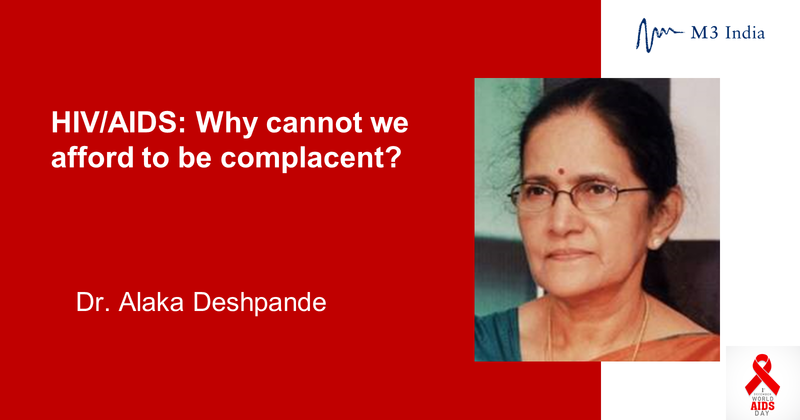World AIDS Day: Prof. Dr. Alaka Deshpande, expert on HIV/AIDS tells us why we cannot afford to be complacent?
M3 India Newsdesk Dec 01, 2018
On this World AIDS Day, we have Prof. Dr. Alaka Deshpande, a Padmashree awardee and a WHO-recognised expert in dealing with HIV/AIDS sharing some important and practical knowledge on the subject that stems from her huge body of work from this area.

Prof. Dr. Deshpande was awarded Padma Shri in 2001 for her path-breaking contribution in the area of HIV care. She has been a Technical Expert on the World Health Organisations Strategic and Technical Advisory Committee on HIV/AIDS, contributing her expertise in this disease from the Indian perspective. The HIV/AIDS awareness campaign was conducted under her guidance.
The declining trends are being reported in the acquisition of new HIV infections. It is a welcome trend but can we afford to be complacent? AZT, the first ARV became available in 1987. Last 3 decades have seen the development of a large number of new antiretroviral molecules, expansion of universal access to free Antiretrovirals (ARV).
Does it bring us closer to HIV Cure ?----Not yet!
Antiretroviral Therapy (ART) guidelines are continuously revised as new data emerges. Due to resource limitations, the approach in developing countries is that of a public health approach. The national guidelines are developed taking the help of WHO guidelines. The lab parameters are also limited.
The present policy in India is TREAT ALL regardless of CD 4 counts, WHO clinical staging, Age and Population Subgroups.
It has certainly increased the longevity by reducing mortality and morbidity! Patients are living longer, leading a near normal life.
However, the challenges are---
- The defaulters
- Viral load is not estimated before initiation of ART therefore it is difficult to assess the viral suppression and efficacy of therapy.
- Due to large number of non-compliant patients, it is not possible to comment upon development of drug resistance in absence of resistance testing.
- An observational study showed that despite free ART for all patients irrespective of CD4 count, about 20 % of cases coming for initiation of free ART have CD4 less than 200/cmm i.e. advanced stage of the disease. It reflects on non-awareness about the Govt ART centres in the community or the reluctance of patients to come forward.
Stavudine has been completely removed from the therapy.
The present choice for first-line ART in India as per National Guidelines is,
1. Tenofovir +Lamivudine + Efavirenz one tablet at bedtime, which reduces pill burden to only one tablet so ease of administration and better compliance. Before initiation of this regimen basic laboratory workup including serum creatinine, serum lipids, CBC should be carried out. Patient’s age should be more than 10 yrs and body weight should be more than 30 kg.
2. In case of abnormal creatinine, Abacavir, Lamivudine, and Efavirenz as a single fixed-dose combination tablet is advised.
- Patients already on AZT ( azidothymidine) regimen may be continued on the same. Zidovudine +Lamivudine +Nevirapine /Efavirenz combination may be continued provided patient is not anaemic.
- Tenofovir Alafenamide has an improved renal and bone density parameters compared to tenofovir. TAF/FTC 25/200 mg combination in view of its better safety profile may be used in place of TDF/LAM. It is available here, in India.
The individual approach can choose any regimen based on the newer guidelines. DHHS guidelines dated October 2018 recommend -
- Estimation of Viral Load before ART initiation
- Resistance Testing HIV-1 proviral DNA genotypic resistance tests to identify drug resistance. It is necessary in view of increasing number of cases infected with transmitted drug-resistant virus.
- Co-Receptor Tropism Testing For patients who have undetectable HIV RNA-- proviral DNA tropism assay to assess co-receptor usage before maraviroc is initiated as part of a new regimen.
These guidelines recommend Integrase Strand Transfer Inhibitors (INSTI ) in the initiation of therapy along with 2 NRTIs.
Recommended regimens are those with demonstrated durable virologic efficacy, favorable tolerability, toxicity profiles, ease of use.
These guidelines recommend Integrase Strand Transfer Inhibitors (INSTIs) in the initiation of therapy along with 2 NRTIs.
INSTI ( Integrase Strand Transfer Inhibitor) plus 2 NRTIs ( Nucleoside reverse transcriptase inhibitors):
• BIC/TAF/FTC*
• DTG/ABC/3TC if HLA-B*5701 negative
• DTG plus tenofovir/FTC
• RAL plus tenofovir/FTC (Recommended Initial Regimens)
BIC-- Bictegravir – Not yet available in India
DTG—Dolutegravir Available in India
RAL----Raltegravir Available in India
Preliminary data from Botswana suggests that there is an increased risk of neural tube defects in infants born to women who were receiving dolutegravir (DTG) at the time of conception.
DTG should not be prescribed for individuals:
- Who are pregnant and within 12 weeks post-conception
- Who are of childbearing potential and planning to become pregnant
- Who are of childbearing potential, sexually active, and not using effective contraception
Viral load should be monitored at 12 and 24 weeks after initiation of treatment.Patient with an undetectable viral load may be followed up clinically and by estimating viral load annually.
Therapy counselling before initiation of ARVs is crucial for therapeutic compliance for expected outcome.
The uninterrupted availability of selected regimen, the medicinal cost, cost of lab parameters and life-long therapy has to be discussed in detail with the patient before initiation.
For special situations and switch therapy, consultation with the experts is necessary.
*BIC/TAF/FTC=Bictegravir + tenofovir alafenamide + emtricitabine
**PPCT=Prevention -of -Parent -to -Child - Transmission
***NNRTI=Non-nucleoside reverse-transcriptase inhibitors
-
Exclusive Write-ups & Webinars by KOLs
-
Daily Quiz by specialty
-
Paid Market Research Surveys
-
Case discussions, News & Journals' summaries